In this comprehensive guide, we’ll explore how glass sliding doors can revolutionize your living spaces, the various options available in the Australian market, and how to select the perfect solution for your home’s specific needs and architectural style.
Why Choose Glass Sliding Doors for Your Home?
Glass sliding doors offer numerous advantages that make them increasingly popular among Australian homeowners. From enhancing natural light to creating a sense of spaciousness, these versatile doors deliver both practical and aesthetic benefits.
Maximized Natural Light
Glass sliding doors dramatically increase the amount of natural light entering your home. This abundance of sunlight not only creates a more inviting atmosphere but also reduces the need for artificial lighting during daylight hours, potentially lowering your energy bills. In Australia’s sun-rich climate, properly positioned glass sliding doors can transform even the darkest rooms into bright, welcoming spaces.
Seamless Indoor-Outdoor Flow
One of the most significant advantages of glass sliding doors is their ability to blur the boundary between indoor and outdoor spaces. When fully opened, these doors create a continuous living area that extends to your garden, patio, or balcony. This seamless transition is perfect for Australia’s outdoor lifestyle and makes entertaining guests a breeze while maximizing your usable living space.
Space Efficiency
Unlike hinged doors that require clearance space to open, sliding doors operate parallel to your wall, making them ideal for areas with limited room. This space-saving design is particularly valuable in compact Australian homes or apartments where every square meter counts. Internal cavity sliding doors take this efficiency even further by disappearing completely into the wall when opened.
Enhanced Property Value
Installing quality glass sliding doors can significantly increase your home’s market appeal and value. Potential buyers are often willing to pay a premium for homes with abundant natural light and indoor-outdoor connectivity. In Australia’s competitive real estate market, this investment in your property’s aesthetic and functional appeal can deliver excellent returns when it’s time to sell.
Energy Efficiency Options
Modern glass sliding doors come with impressive energy efficiency features. Double glazing creates an insulating air barrier that helps maintain your home’s temperature, reducing heating and cooling costs. Low-E glass options reflect heat while allowing light to pass through, particularly valuable in Australia’s varied climate zones from tropical north to temperate south.
Versatile Design Applications
Glass sliding doors are remarkably versatile, working equally well in traditional and contemporary homes. They can be used for exterior access, internal room dividers, wardrobe sliding doors, or even as shower enclosures. With customizable frame colors, glass types, and configurations, these doors can be tailored to complement any architectural style or interior design scheme.
Ready to transform your space with natural light?
Discover how custom glass sliding doors can enhance your home’s aesthetics while improving functionality and energy efficiency.
Types of Glass Sliding Door Systems
The Australian market offers several glass sliding door configurations to suit different architectural styles, space requirements, and functional needs. Understanding the various options will help you select the perfect solution for your home.
Standard Sliding Glass Doors
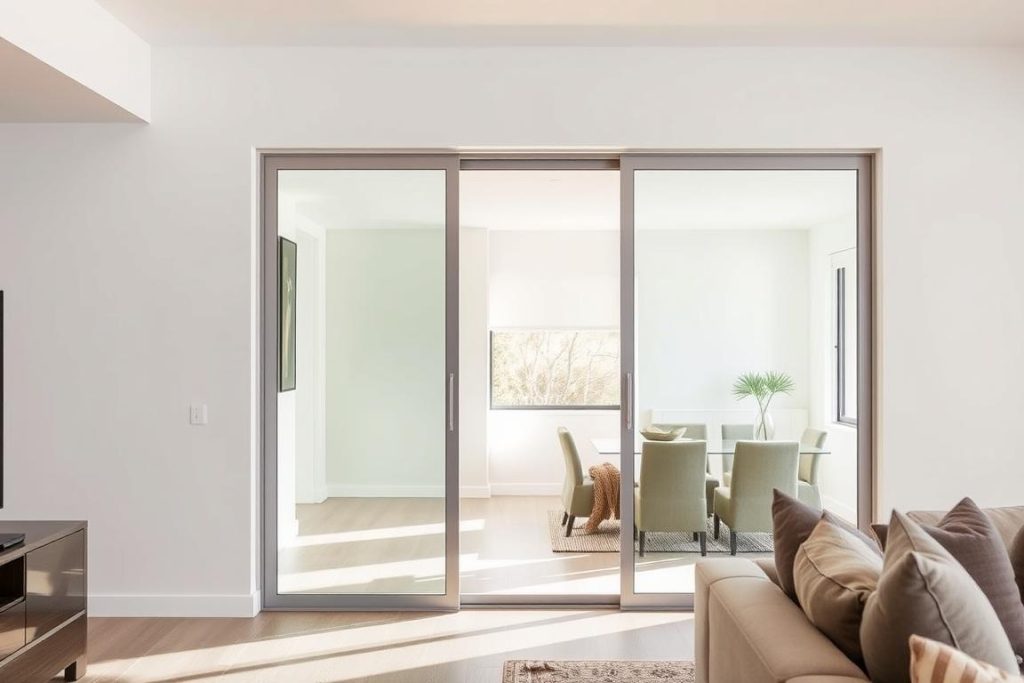
Standard sliding glass doors are the most common configuration found in Australian homes. These systems feature two or more panels, with at least one fixed panel and one that slides horizontally along a track. They offer excellent value while providing substantial glass area for light transmission.
Key Features:
- Available in two, three, or four-panel configurations
- Smooth-rolling operation on quality track systems
- Space-efficient design ideal for areas with limited clearance
- Compatible with security screens and flyscreen sliding doors
- Various glass options including clear, tinted, or patterned
Considerations:
- Only provides partial opening (typically 50% of the doorway)
- Requires regular track maintenance for optimal operation
- Standard systems have visible frames that slightly reduce glass area
- Available from suppliers like Bunnings or specialty door retailers
Stacker Sliding Doors
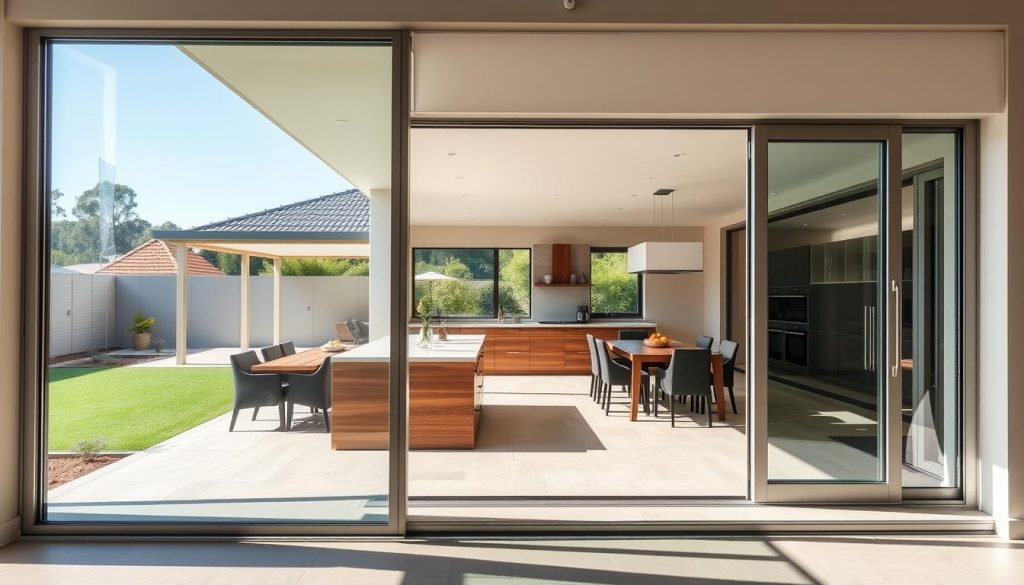
For homeowners seeking to maximize their opening width, stacker sliding doors offer an excellent solution. These systems feature multiple panels that slide and stack behind one another, creating a much wider opening than standard sliding doors.
Key Features:
- Multiple panels (typically 3-6) that stack behind one another
- Creates openings of up to 70-75% of the total doorway width
- Ideal for connecting large indoor spaces to outdoor entertaining areas
- Available with recessed tracks for seamless floor transitions
- Premium hardware systems ensure smooth operation despite multiple panels
Considerations:
- Higher cost than standard sliding door systems
- Requires sufficient wall space for stacked panels
- More complex installation requiring professional expertise
- Heavier system may need reinforced structural support
Frameless Glass Sliding Systems
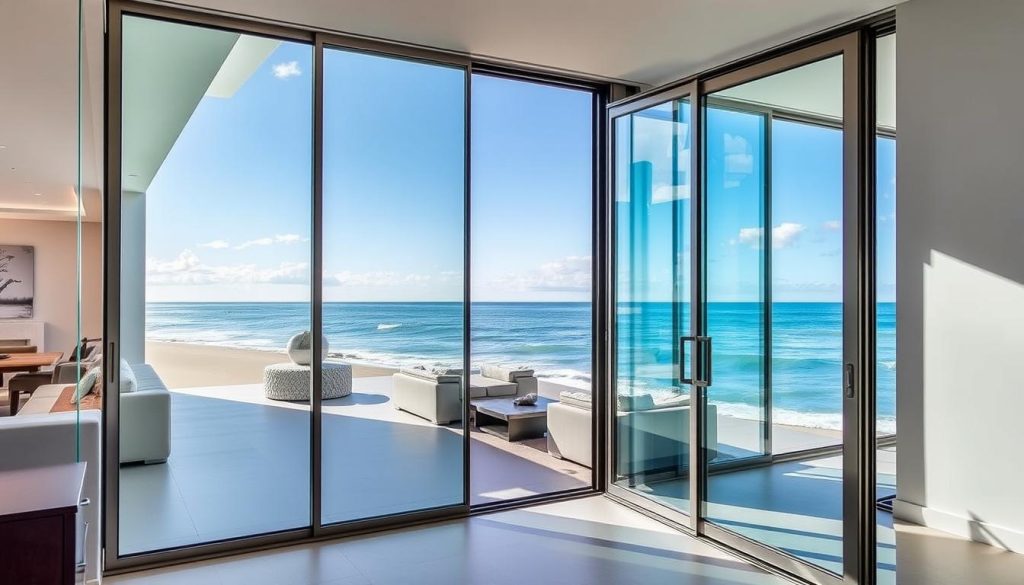
For the ultimate in contemporary aesthetics, frameless glass sliding doors offer a minimalist solution with maximum visual impact. These systems use thick tempered glass with minimal visible hardware, creating an almost invisible barrier between spaces.
Key Features:
- Virtually invisible appearance with minimal hardware
- Maximum light transmission without frame obstruction
- Premium toughened glass for safety and durability
- Sophisticated rolling systems for smooth operation
- Statement design element for luxury homes
Considerations:
- Premium price point reflecting specialized materials and installation
- Requires precision installation by experienced professionals
- Limited thermal insulation compared to framed double-glazed options
- May require more frequent cleaning to maintain pristine appearance
Not sure which glass sliding door system is right for your home?
BrightView Aluminium specializes in custom sliding door solutions tailored to your specific architectural requirements and lifestyle needs.
Security Features for Glass Sliding Doors
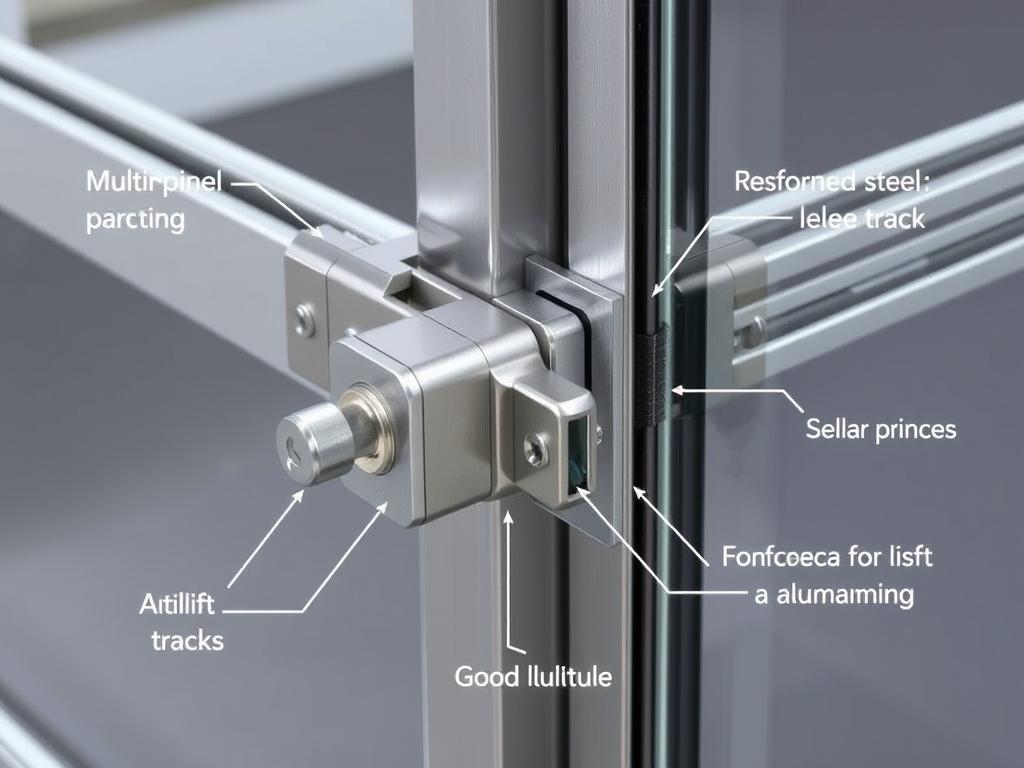
Security is a primary concern for many Australian homeowners considering glass sliding doors. Modern systems incorporate several advanced security features that provide peace of mind without compromising on aesthetics or functionality.
Locking Mechanisms
Today’s glass sliding doors offer sophisticated locking options that go far beyond the basic latches of older systems:
Multi-Point Locking Systems
Premium sliding doors feature multi-point locks that secure the door at several locations simultaneously. These systems engage locking points at the top, middle, and bottom of the door, creating a much more secure barrier than single-point locks. For glass sliding doors, these multi-point systems significantly enhance resistance to forced entry attempts.
Deadbolt Integration
Many quality sliding door systems can be equipped with deadbolt locks for additional security. These locks for glass sliding doors provide a secondary locking mechanism that operates independently from the main handle, offering an extra layer of protection. Some systems feature keyed deadbolts for access from both sides.
Smart Locking Options
For tech-savvy homeowners, smart locks designed specifically for sliding doors offer convenience and enhanced security. These systems can be integrated with home automation platforms, allowing remote locking/unlocking, status monitoring, and even customized access schedules. Some advanced systems include tamper alerts that notify you of unauthorized access attempts.
Reinforced Glass Options
The glass itself plays a crucial role in the security profile of sliding doors:
- Laminated Safety Glass: Features a tough interlayer that holds the glass together even when broken, making it extremely difficult to penetrate
- Toughened Safety Glass: Up to five times stronger than regular glass and shatters into small, less dangerous pieces when broken
- Security Glass: Specialized multi-layer glass designed specifically to resist break-in attempts
- Double Glazing: Provides not only thermal insulation but also an additional physical barrier
Security Tip
For maximum security, consider security sliding doors from Bunnings or specialized suppliers that feature both laminated glass and multi-point locking systems. These doors meet Australian security standards while maintaining aesthetic appeal.
Track and Frame Security
Beyond locks and glass, several features in the door’s construction enhance security:
- Anti-Lift Mechanisms: Prevent the door from being lifted out of its tracks from the outside
- Reinforced Aluminium Frames: Provide structural integrity that resists forcing or bending
- Security Mesh Integration: Compatible with security screens for additional protection
- Track Blockers: Physical devices that prevent the door from sliding open even if the lock is compromised
Installation Considerations for Glass Sliding Doors
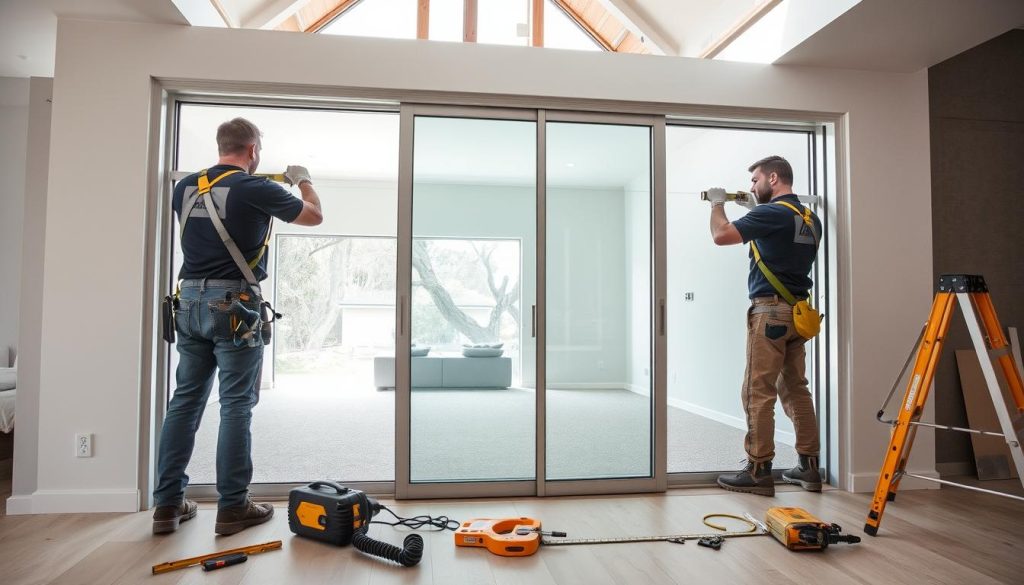
Proper installation is crucial for ensuring your glass sliding doors perform optimally in terms of operation, security, and energy efficiency. Whether you’re considering a DIY approach or professional installation, understanding the process helps you make informed decisions.
Professional vs. DIY Installation
While some homeowners may consider installing sliding doors themselves, there are important factors to consider when making this decision:
Professional Installation Benefits
- Ensures precise alignment for smooth operation and proper sealing
- Includes proper structural reinforcement where needed
- Guarantees correct integration with existing building elements
- Often includes warranties covering both products and workmanship
- Typically completed in a single day with minimal disruption
Professional installation is strongly recommended for larger systems, cavity sliding doors, and frameless glass installations where precision is critical.
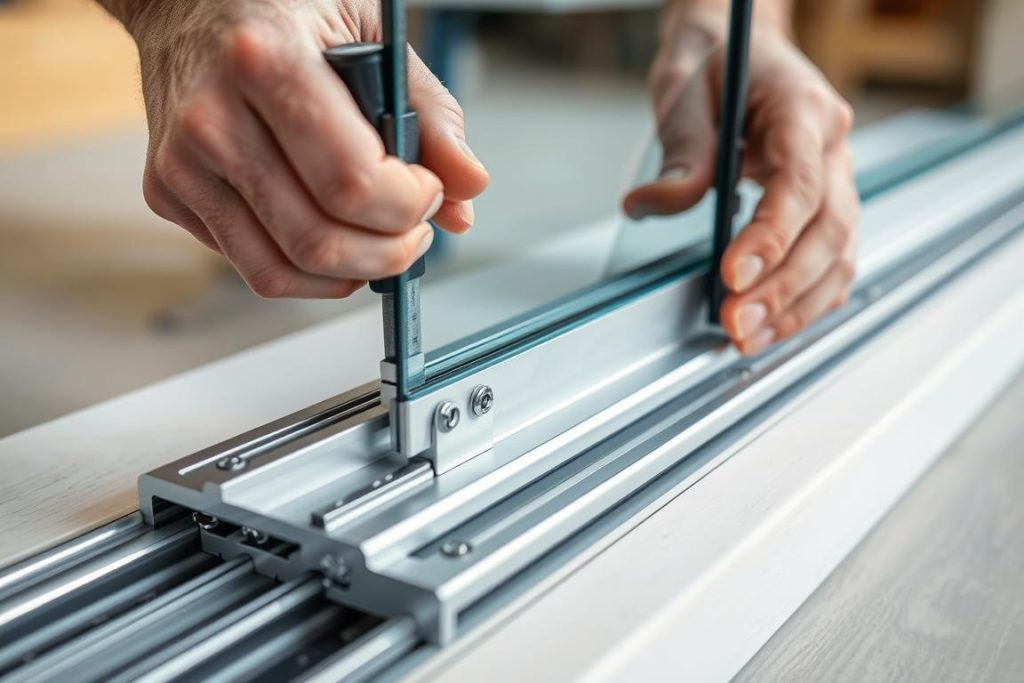
Structural Requirements
Before installation begins, several structural considerations must be addressed:
Load-Bearing Capacity
Glass sliding doors, especially larger systems, can be quite heavy. Your installation must consider:
- Adequate header support above the opening
- Proper distribution of weight to foundation elements
- Reinforcement of existing structures if necessary
- Compliance with Australian building codes for structural integrity
Opening Preparation
Preparing the opening correctly is essential for a successful installation:
- Precise measurements of the rough opening dimensions
- Square and level opening edges
- Proper flashing and waterproofing
- Consideration of floor level transitions for seamless operation
“The quality of installation directly impacts the longevity, security, and energy efficiency of glass sliding doors. Even the highest quality door will perform poorly if installed incorrectly.”
Installation for Different Door Types
The installation approach varies significantly depending on the type of sliding door system:
Standard Sliding Doors
Standard aluminium sliding doors from Bunnings or specialty suppliers typically involve a straightforward installation process. The pre-fabricated frame is secured in the prepared opening, leveled, and sealed. The glass panels are then installed into the frame and adjusted for proper operation. This installation usually takes 4-6 hours for experienced professionals.
Cavity Sliding Doors
Internal cavity sliding doors require more extensive preparation as they slide into a pocket within the wall. This installation involves creating or modifying the wall cavity, installing a specialized frame system, and ensuring proper alignment for smooth disappearance into the wall. These installations are typically part of new construction or major renovations.
Frameless Systems
Frameless glass sliding doors demand the highest level of precision during installation. The minimal hardware must be perfectly aligned to ensure smooth operation of the heavy glass panels. Floor tracks need to be precisely recessed, and all components must be meticulously leveled. This specialized installation should only be performed by experienced professionals.
Expert Installation Makes All the Difference
BrightView Aluminium offers professional measurement and installation services for glass sliding doors, ensuring perfect operation and longevity.
Design and Aesthetic Considerations
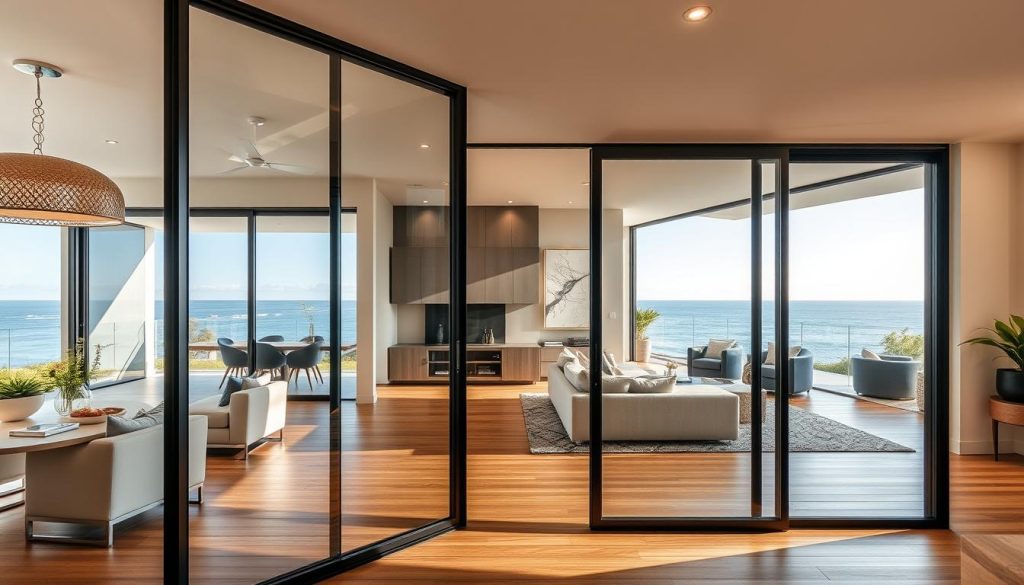
Beyond functionality, glass sliding doors serve as a significant design element in your home. Their visual impact can define your space’s character while complementing your overall interior design scheme.
Frame Materials and Finishes
The frame of your glass sliding door significantly influences its appearance and performance:
Aluminium Frames
Aluminium sliding doors remain the most popular choice in Australia due to their excellent strength-to-weight ratio and versatility. Available in powder-coated finishes ranging from classic white to contemporary black or natural anodized silver, aluminium frames offer exceptional durability in Australia’s harsh climate while providing slim profiles that maximize glass area.
Timber Frames
For homes with a traditional aesthetic, timber-framed sliding doors provide natural warmth and character. While requiring more maintenance than aluminium, quality hardwood frames offer excellent insulation properties and can be stained or painted to match your interior woodwork. Many manufacturers offer timber-aluminium composite options that combine the beauty of wood interiors with weather-resistant aluminium exteriors.
Minimal Frames
For contemporary homes, minimal frame systems maximize glass area while providing clean, architectural lines. These sophisticated systems feature ultra-slim aluminium profiles that almost disappear from view, creating a seamless connection between spaces. While commanding a premium price, these systems deliver unmatched aesthetic impact and light transmission.
Glass Options and Visibility
The glass selection affects both the appearance and performance of your sliding doors:
- Clear Glass: Maximizes visibility and light transmission, ideal for scenic views
- Low-E Glass: Virtually clear while providing enhanced thermal performance
- Tinted Glass: Available in gray, bronze, blue or green tints to reduce glare and heat
- Frosted or Patterned Glass: Provides privacy while still transmitting light
- Smart Glass: Electronically switchable from clear to opaque for on-demand privacy
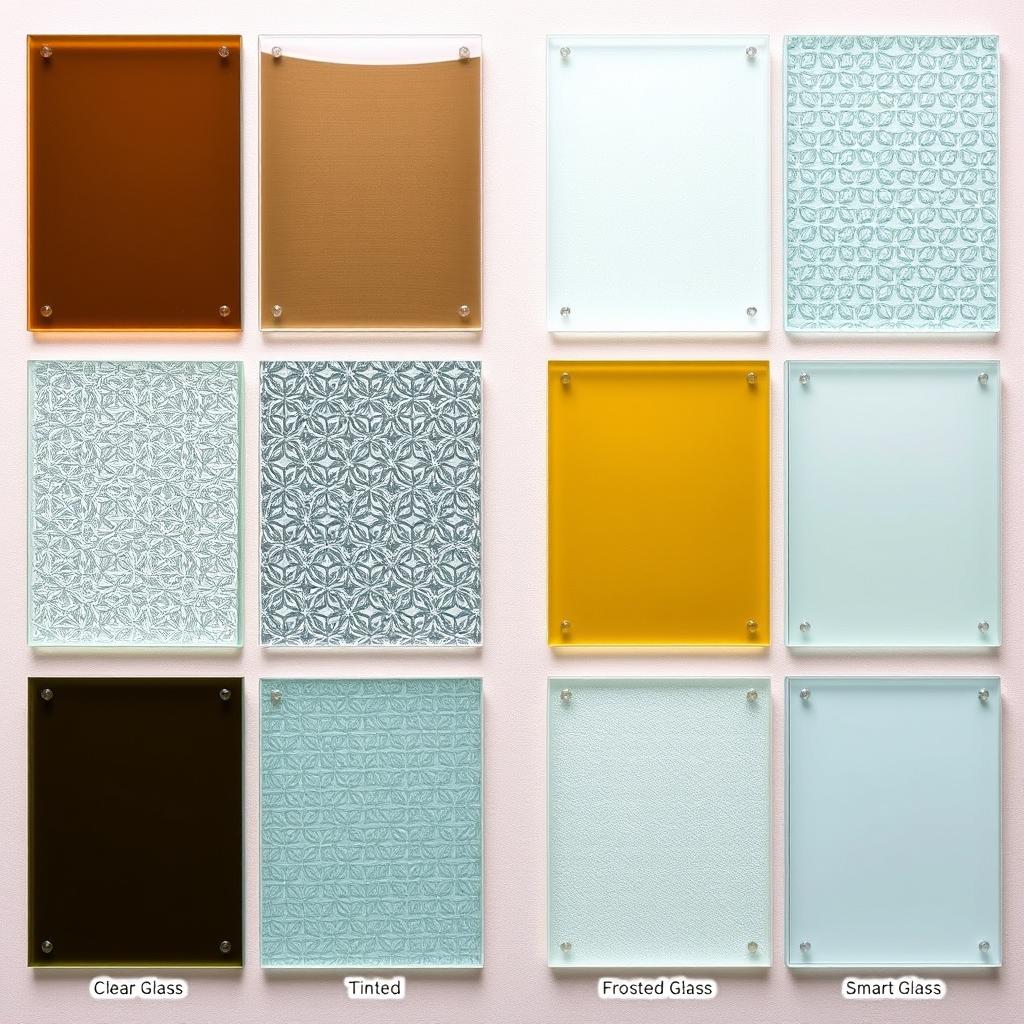
Hardware and Accessories
The finishing touches on glass sliding doors contribute significantly to both function and appearance:
Door Handles
Door handles for sliding doors range from minimalist finger pulls to substantial lever handles. Available in finishes including brushed nickel, matte black, chrome, and brass, these hardware elements should complement your home’s existing door hardware and overall design scheme. For larger doors, ergonomic D-handles provide the leverage needed for smooth operation.
Threshold Options
The threshold design affects both aesthetics and functionality. Flush thresholds create seamless transitions between indoor and outdoor spaces but require careful waterproofing. Raised thresholds offer better weather protection but create a visual break in flooring. Semi-recessed options balance these considerations for most Australian homes.
Integrated Blinds
For the ultimate in convenience, consider sliding doors with blinds integrated between glass panels. These systems offer adjustable privacy and light control without the cleaning challenges of conventional blinds. Available in various styles and operation methods (manual or motorized), they provide a sleek, contemporary solution for managing light and privacy.
Complementary Elements
Several design elements can enhance the impact of your glass sliding doors:
To maximize the aesthetic impact of your sliding glass doors, consider:
- Coordinating interior flooring with exterior paving for visual continuity
- Installing similar ceiling heights in connected indoor and outdoor spaces
- Using complementary color schemes that flow between areas
- Incorporating bifold sliding doors in adjacent areas for consistent styling
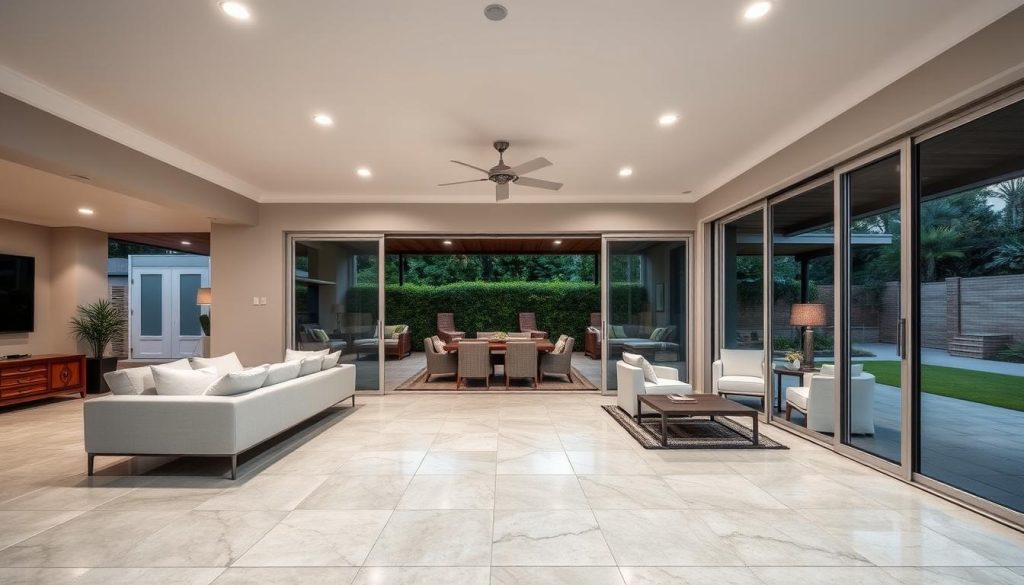
Energy Efficiency and Performance
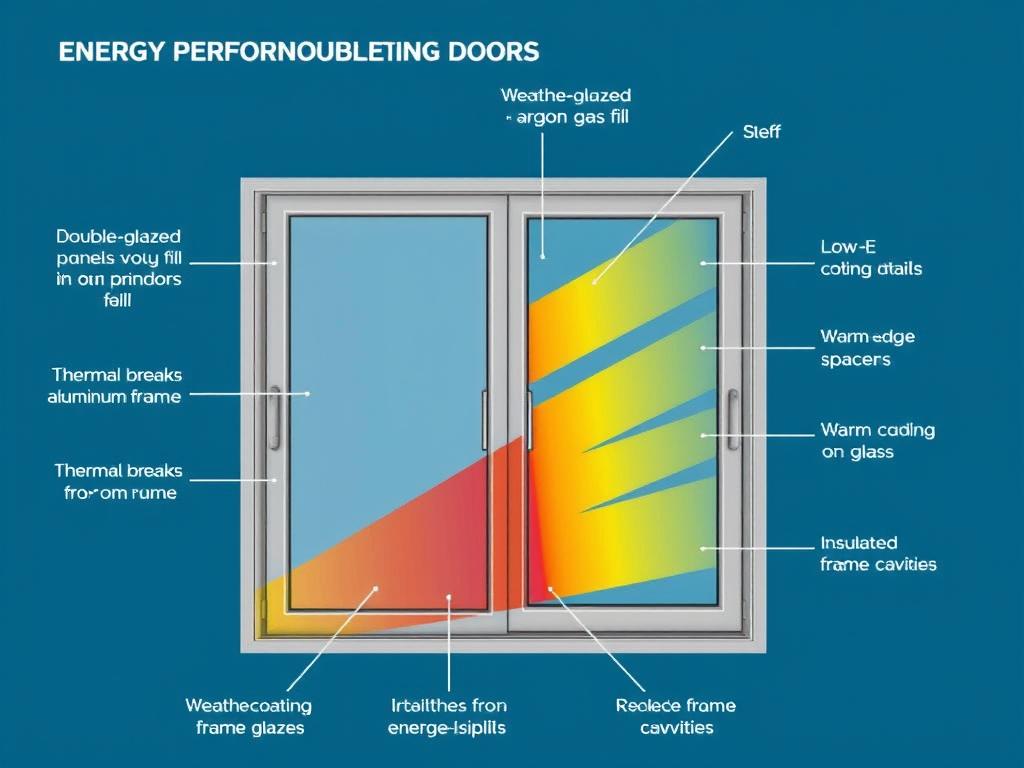
In Australia’s diverse climate zones, the energy performance of glass sliding doors plays a crucial role in your home’s comfort and running costs. Modern systems offer impressive efficiency features that help maintain your home’s thermal envelope.
Glazing Technologies
The glass component of sliding doors has seen significant technological advancements:
Double Glazing
Double glazing creates an insulating air gap between two glass panels, dramatically reducing heat transfer compared to single glazing. This technology is particularly valuable for sliding doors, which typically have large glass areas. In Australian homes, double glazing can reduce heat gain in summer and heat loss in winter by up to 30%, significantly improving comfort and reducing energy costs.
Low-E Glass
Low-emissivity (Low-E) glass features a microscopically thin metal oxide coating that reflects heat while allowing light to pass through. For Australian homes, this means interior heat stays inside during winter, while summer heat is reflected away. When combined with double glazing, Low-E technology creates exceptionally energy-efficient sliding doors suitable for all climate zones.
Gas Fills
Premium double-glazed sliding doors use inert gas fills (typically argon) between glass panels instead of air. These gases have higher insulation properties than air, further enhancing thermal performance. While adding to the initial cost, gas-filled units deliver superior energy efficiency that pays dividends in comfort and reduced energy bills throughout the door’s lifespan.
Frame Thermal Performance
The door frame’s design significantly impacts overall energy efficiency:
Thermal Breaks
Quality aluminium sliding doors incorporate thermal breaks—non-conductive barriers within the frame that prevent heat transfer between interior and exterior surfaces. These breaks are particularly important in aluminium systems, as metal naturally conducts heat and cold. Thermally broken frames can improve the door’s overall insulation value by up to 60% compared to standard aluminium frames.
Multi-Chamber Designs
Advanced frame systems feature multiple internal chambers that trap air for additional insulation. These sophisticated profiles provide superior thermal performance while maintaining the strength needed for large glass panels. When combined with thermal breaks, multi-chamber designs create frames that rival the insulation properties of timber while offering aluminium’s durability and low maintenance.
| Glass Type | U-Value (Lower is Better) | SHGC (Solar Heat Gain) | VLT (Visible Light) | Best For |
| Single Clear Glass | 5.8-6.2 | 0.82-0.86 | 88-90% | Budget applications, mild climates |
| Double Clear Glass | 2.7-3.0 | 0.70-0.76 | 78-80% | General improvement, moderate climates |
| Double Low-E Glass | 1.6-1.8 | 0.27-0.62* | 64-74% | Energy efficiency, most Australian climates |
| Triple Glazed Low-E | 0.8-1.2 | 0.25-0.50* | 55-65% | Premium efficiency, extreme climates |
*SHGC varies based on specific Low-E coating type (solar control vs. insulating)
Weather Sealing
Effective sealing is crucial for both energy efficiency and weather resistance:
- Brush Seals: Create a flexible barrier against air infiltration while allowing smooth door operation
- Compression Seals: Form a tight barrier when the door is closed, ideal for exposed locations
- Multi-Point Contact: Advanced systems create seals at multiple locations around the door perimeter
- Water Drainage: Engineered channels direct any moisture away from the interior
Energy Efficiency Tip
For optimal energy performance in Australian conditions, look for sliding doors with WERS (Window Energy Rating Scheme) ratings appropriate for your climate zone. Northern regions benefit from low SHGC values, while southern areas should prioritize low U-values.
Maintenance and Care for Glass Sliding Doors
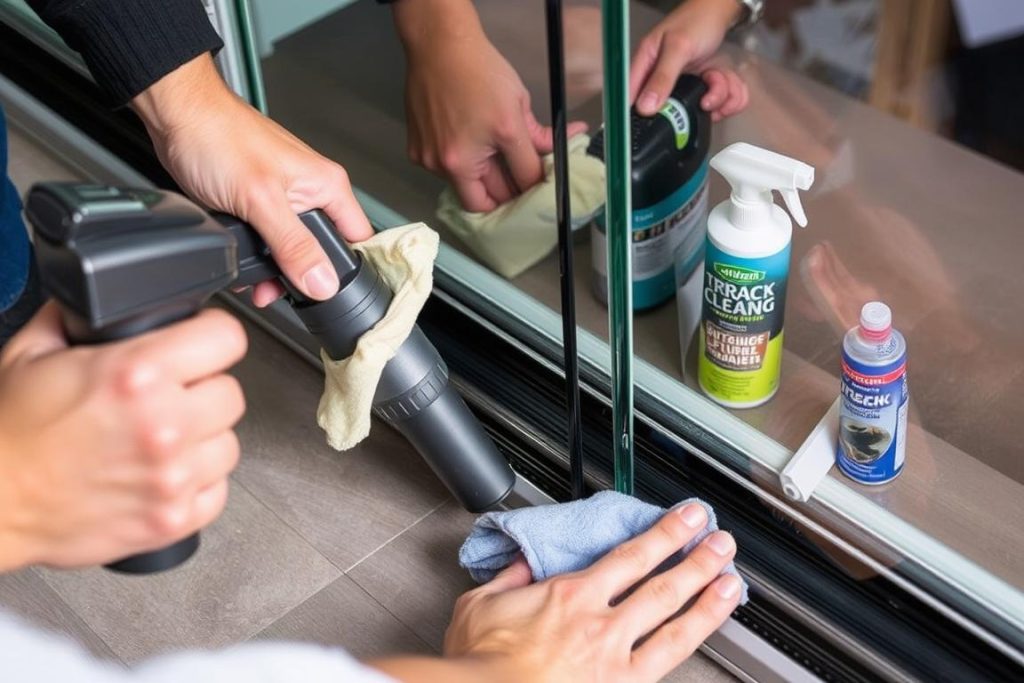
Proper maintenance ensures your glass sliding doors continue to operate smoothly while maintaining their appearance and energy efficiency. Establishing a regular care routine extends the lifespan of both the door system and its components.
Routine Cleaning
Regular cleaning prevents dirt buildup that can affect both appearance and function:
Glass Maintenance
- Clean glass surfaces with a quality glass cleaner or mild soapy water
- Use a squeegee or lint-free cloth to avoid streaks
- Avoid cleaning in direct sunlight to prevent streaking
- Address fingerprints and smudges promptly for easiest removal
Track Cleaning
- Vacuum tracks regularly to remove debris and dirt
- Use a narrow attachment to reach into track channels
- Wipe with a damp cloth to remove finer particles
- Apply silicone-based lubricant sparingly to ensure smooth operation
Seasonal Maintenance
Perform these checks at least twice yearly to ensure optimal performance:
Hardware Inspection
Examine all door hardware including handles, locks, and rollers for signs of wear or loosening. Tighten any loose screws and lubricate moving parts with an appropriate product. For locks for glass sliding doors, ensure smooth operation and address any stiffness immediately to prevent mechanism damage. Replace worn components promptly to maintain security and functionality.
Seal Examination
Check all weather seals and brushes for compression, damage, or detachment. These components are crucial for energy efficiency and weather resistance. Replace any deteriorated seals promptly using manufacturer-recommended products. Pay particular attention to bottom seals which often experience the most wear from regular operation and exposure to elements.
Frame Inspection
Inspect the door frame for any signs of damage, corrosion, or water intrusion. For aluminium sliding doors, check for scratches in the powder coating that might lead to corrosion. Address any finish damage promptly with touch-up paint recommended by the manufacturer. Ensure drainage holes remain clear to prevent water accumulation.
Troubleshooting Common Issues
Address these common problems promptly to maintain functionality:
Difficult Sliding Operation
If your sliding door becomes difficult to move:
- Clean tracks thoroughly to remove all debris
- Check rollers for damage and replace if necessary
- Verify the door hasn’t shifted out of alignment
- Adjust roller height if the door is dragging
- Apply appropriate lubricant to rollers and tracks
Condensation Between Glass Panels
If you notice moisture between glass panes in double-glazed units:
- This indicates seal failure in the insulated glass unit
- Unfortunately, this cannot be repaired – the glass unit must be replaced
- Contact the manufacturer or a glass specialist for replacement
- Consider upgrading to newer energy-efficient glass during replacement
Lock Alignment Problems
If door locks are difficult to engage:
- Check for proper door alignment in the frame
- Inspect the strike plate for proper positioning
- Adjust roller height to align the door properly
- Lubricate lock mechanisms with graphite powder (not oil)
- For persistent issues, consult a door specialist
Maintenance Warning
Never use WD-40 or oil-based lubricants on sliding door tracks or rollers. These products attract dust and dirt, eventually making the problem worse. Instead, use dry silicone spray or specific track lubricants recommended by door manufacturers.
Enhancing Your Glass Sliding Doors with Accessories
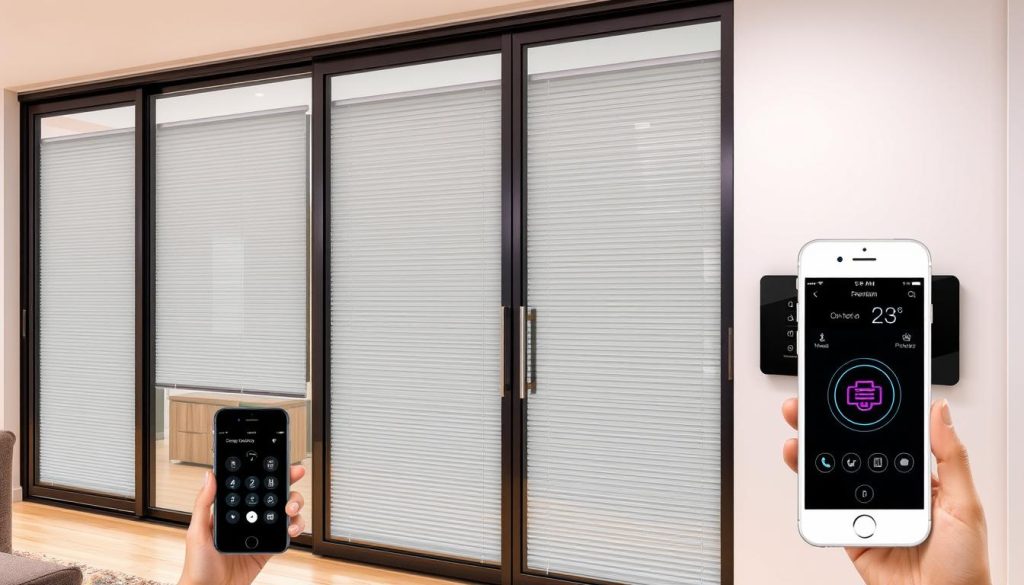
The functionality and appearance of glass sliding doors can be significantly enhanced with thoughtfully selected accessories. From practical additions that improve convenience to decorative elements that elevate aesthetics, these complementary products help you maximize the benefits of your sliding door system.
Privacy and Light Control
Managing privacy and light levels is essential for comfortable living spaces:
Integrated Blinds
Blinds sealed between glass panels offer the ultimate in convenience and cleanliness. Protected from dust and damage, these systems provide adjustable privacy and light control without maintenance concerns. Available in various styles including venetian, pleated, and roller designs, they can be operated manually or with motorized systems for ultimate convenience.
External Screens
Flyscreen sliding doors provide essential insect protection while maintaining ventilation. Modern systems feature almost invisible mesh that preserves views and airflow. For additional sun protection, consider solar screens that block UV rays and reduce heat gain while maintaining outward visibility. These screens can be fixed or retractable depending on your preferences.
Smart Glass
For the ultimate in technological sophistication, switchable smart glass transitions from transparent to opaque at the touch of a button. This revolutionary technology eliminates the need for blinds or curtains while providing instant privacy when desired. Though representing a premium investment, smart glass offers unmatched convenience and contemporary appeal.
Security Enhancements
Additional security features provide extra peace of mind:
Secondary Locks
Supplementary security options for sliding glass doors include:
- Track blockers that physically prevent the door from sliding
- Keyed security bolts that secure the door to the frame
- Patio door locks that clamp onto the track
- Security bars that brace against the door
Alarm Integration
Modern security systems can monitor sliding doors through:
- Glass break sensors that detect the frequency of breaking glass
- Contact sensors that alert when the door is opened
- Motion detectors that monitor the area around the door
- Smart locks that integrate with home security systems
Specialized Applications
Certain accessories address specific needs or enhance functionality:
Pet Access Solutions
Sliding doors with dog door features allow pet access without compromising security or energy efficiency. These specialized systems integrate a pet door directly into one panel of the sliding glass door, providing a convenient solution for pet owners. Available in various sizes to accommodate different breeds, these doors maintain the sleek appearance of your sliding door system while adding practical functionality.
Child Safety Features
For households with young children, safety accessories provide important protection. Options include sliding door locks positioned at adult height, impact-resistant glass to prevent injuries, and door position limiters that prevent fingers from being caught. These thoughtful additions ensure your sliding doors remain family-friendly while maintaining their aesthetic appeal.
Automation Systems
For the ultimate in convenience, motorized operation systems can be added to many sliding door configurations. These systems allow effortless opening and closing via remote control, smartphone app, or voice command when integrated with smart home systems. Particularly valuable for large or heavy doors, automation adds a touch of luxury while improving accessibility for all users.
Compatibility Tip
When selecting accessories for your sliding glass doors, always verify compatibility with your specific door system. Many accessories are designed for particular track types, glass thicknesses, or door configurations. Consulting with a specialist ensures you select products that integrate seamlessly with your existing doors.
Conclusion: Transforming Your Space with Glass Sliding Doors
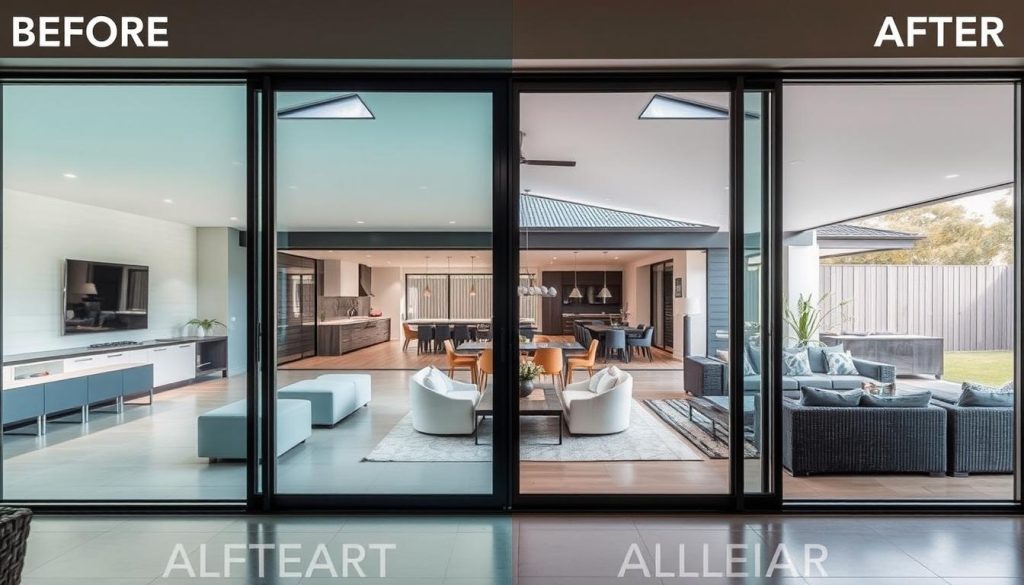
Glass sliding doors represent one of the most impactful home improvements available to Australian homeowners. By creating a seamless connection between indoor and outdoor spaces while maximizing natural light, these versatile doors transform both the functionality and aesthetics of your home.
Key Considerations for Your Project
Quality Investment
While budget considerations are important, investing in quality components pays significant dividends in performance, durability, and satisfaction. Premium glass sliding doors offer superior operation, enhanced security, better energy efficiency, and more attractive aesthetics. Consider the long-term value rather than focusing solely on initial cost when selecting your door system.
Professional Installation
Even the highest quality sliding doors will underperform if improperly installed. Professional installation ensures correct alignment, proper sealing, and optimal operation. For specialized systems like internal cavity sliding doors or frameless glass installations, expert installation is particularly crucial to achieving the desired results and longevity.
Customization Options
Today’s market offers unprecedented customization possibilities for glass sliding doors. From frame finishes and glass types to hardware styles and integrated technologies, you can create a solution perfectly tailored to your home’s architecture and your personal preferences. Don’t settle for standard options when customized solutions are readily available.
The Transformative Impact
The installation of glass sliding doors delivers multiple benefits that enhance your daily living experience:
- Enhanced Natural Light: Sliding glass doors dramatically increase daylight penetration, creating brighter, more inviting interiors that enhance mood and reduce lighting costs.
- Expanded Living Space: By creating a seamless connection to outdoor areas, sliding doors effectively expand your usable living space, perfect for Australia’s indoor-outdoor lifestyle.
- Improved Property Value: Quality glass sliding doors represent an investment that typically delivers excellent returns through increased property appeal and market value.
- Energy Performance: Modern systems with advanced glazing and thermal breaks contribute to improved home energy efficiency and comfort in all seasons.
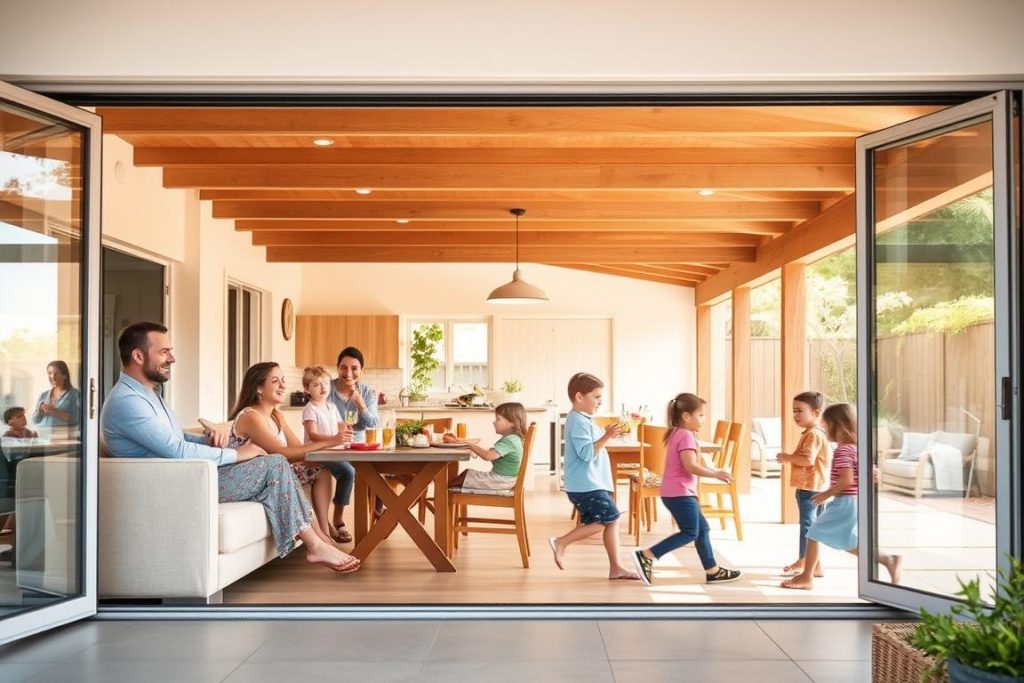
Ready to Transform Your Home with Elegant Glass Sliding Doors?
BrightView Aluminium specializes in custom sliding door solutions that perfectly balance style, security, and energy efficiency for Australian homes.